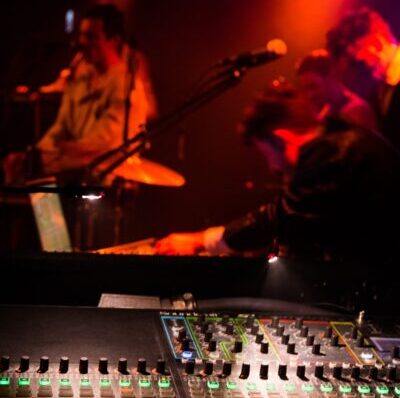On the day of a gig, you will be full of nerves, excitement and energy that you can’t wait to get out of your system on the stage. Sound check may feel like another barrier to that. Just more time waiting around. But, it is perhaps the most important piece of preparation you do before you go and play the best gig of your life.
You will have a lot on your mind, but remembering these rules of etiquette will mean that you will be liked by the sound engineer and the other bands playing and the quality and clarity of your performance will shine through for all to hear.
Here are five rules that you should remember:
Rule One
Show up on time and get off the stage quickly
It might not be you who does this, but the band that slows everyone down rarely gets invited to play other gigs. If you slow down the process, either your band or another band won’t get the time to iron out all the details with the sound engineer. When you are given the okay, get off the stage and make sure that you put your equipment somewhere that won’t be stolen and is easily accessible to you and out of the way of the band that is sound checking next. Put it in the green room and don’t leave it on the stage or on the floor of the venue.
READ MORE: What recording your first song is like, with Jay and Isaac
Rule Two
Be patient and trust the sound engineer
Sound engineers have checked hundreds, if not thousands of bands and will have a routine that is unique to them. They will dedicate time to each member, so don’t start talking down the mic when it’s not your turn saying: “I can’t hear myself” or “could you turn up the drums”. Each band member will be checked , one by one, which will sound amazing when it all comes together. Go with the flow of the sound engineer and you will get the best results in a short amount of time.
If you let the engineer do their job right, you will be able to hear everything you need. Don’t worry if you think what you are hearing isn’t the same as what the audience is hearing. The monitors on stage are mixed to separate channels on the mixing desk – have faith in the engineer, they know how every speaker should sound.
Rule Three
Be nice to the other bands and be nice especially to the sound engineer
Building a good rapport with the other bands is great. You will most likely be borrowing amps and pedals as it is easier to use one set of amps rather than them swapping out and re-leveling. It is convenient and saves time.
Building a relationship with other bands is great for making connections and if you need something, most bands are more than happy to lend you what you need – speaking with them a few days before gives them time to prepare, as a persons equipment is very precious – and be prepared to replace that equipment if it does get broken in you care.
But building a rapport with the sound engineer is vital. They are in control of how you sound, if you piss them off and lose their respect, they will still give you a decent mix, but why would they spend time fiddling around with extra details that would otherwise make your sound pop to a band that doesn’t respect them?
Sound engineers are amazing people and are there to serve you. Buy them a drink or give them a hand with moving equipment if they ask you to. They are also the person the venue owner and promoters will ask if they should bring a band back for another gig – an opportunity not to be missed simply by being kind.
Rule Four
Don’t fiddle with you settings after the sound check
After the sound check, the settings on the mixing desk are locked in and the engineer should not be expecting to have to dramatically change something during the gig because you can’t hear yourself or you think something is not quite right. Again, the sound you are hearing is not the same as what the audience is hearing. If you want something changed, just ask them between songs and they will know what to do. And don’t change the settings on someone else’s’ gear, except maybe the master volume – you wouldn’t want someone messing around with a tone that has taken you time to dial in.
Rule Five
Play like it’s the real thing
The sound engineer will get a feel for your sound from the off and will know which elements to highlight even if they haven’t heard you play a full set before. They are very quick to any changes but if you play limp wrist-ed and quietly during the sound check and go guns-a-blazing on the night, you will be to loud and the audience will recoil as you deafen them (not a great start if you want the audience to like you) and the engineer will have to remix you whilst you play the set – a few changes here and there goes unnoticed but it’s obvious if the entire shape of the sound is being changed.
Lastly, the order of the sound check is if you are on first, you are checked last, don’t think you get special treatment because you have a lot of technical elements or equipment, if everyone follow these rules, there will be enough time for everyone to get their fair turn.
Follow us on Instagram, Twitter, Facebook and Tiktok for more content!









